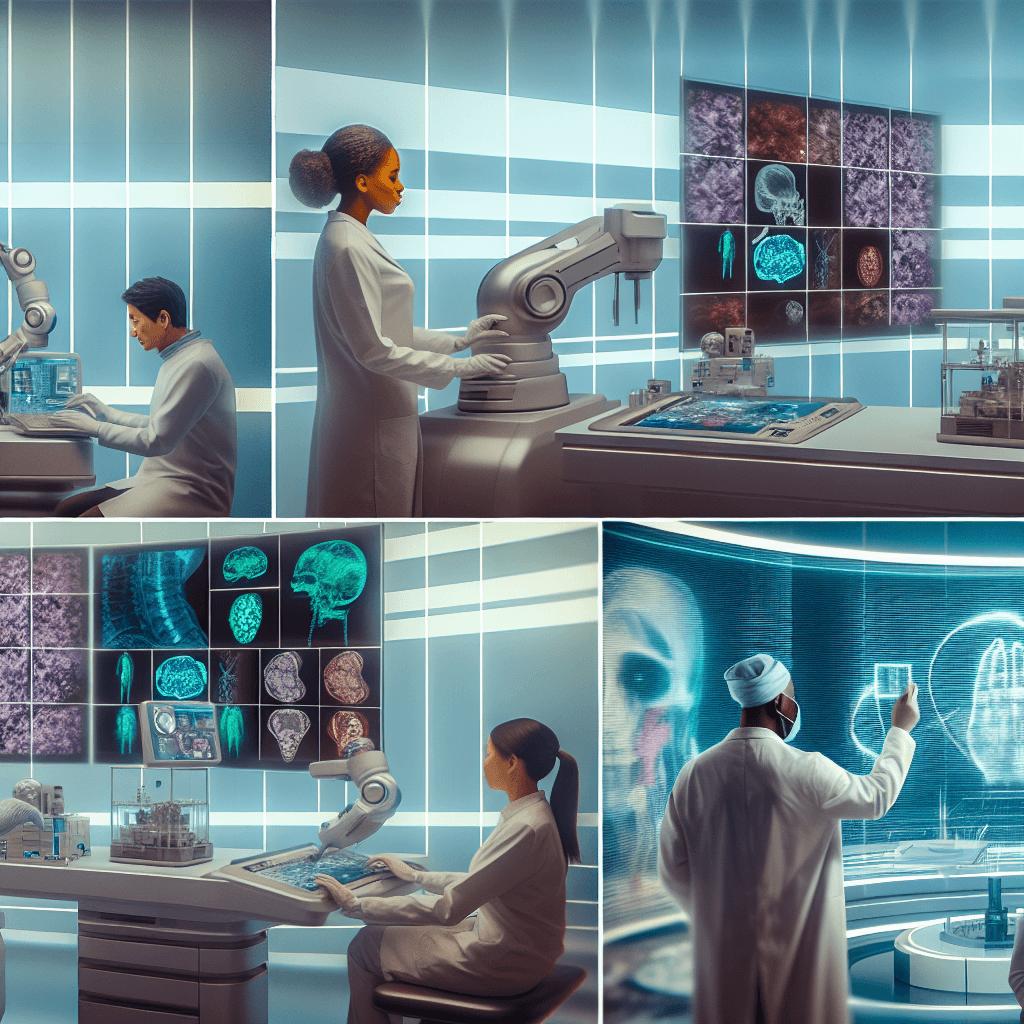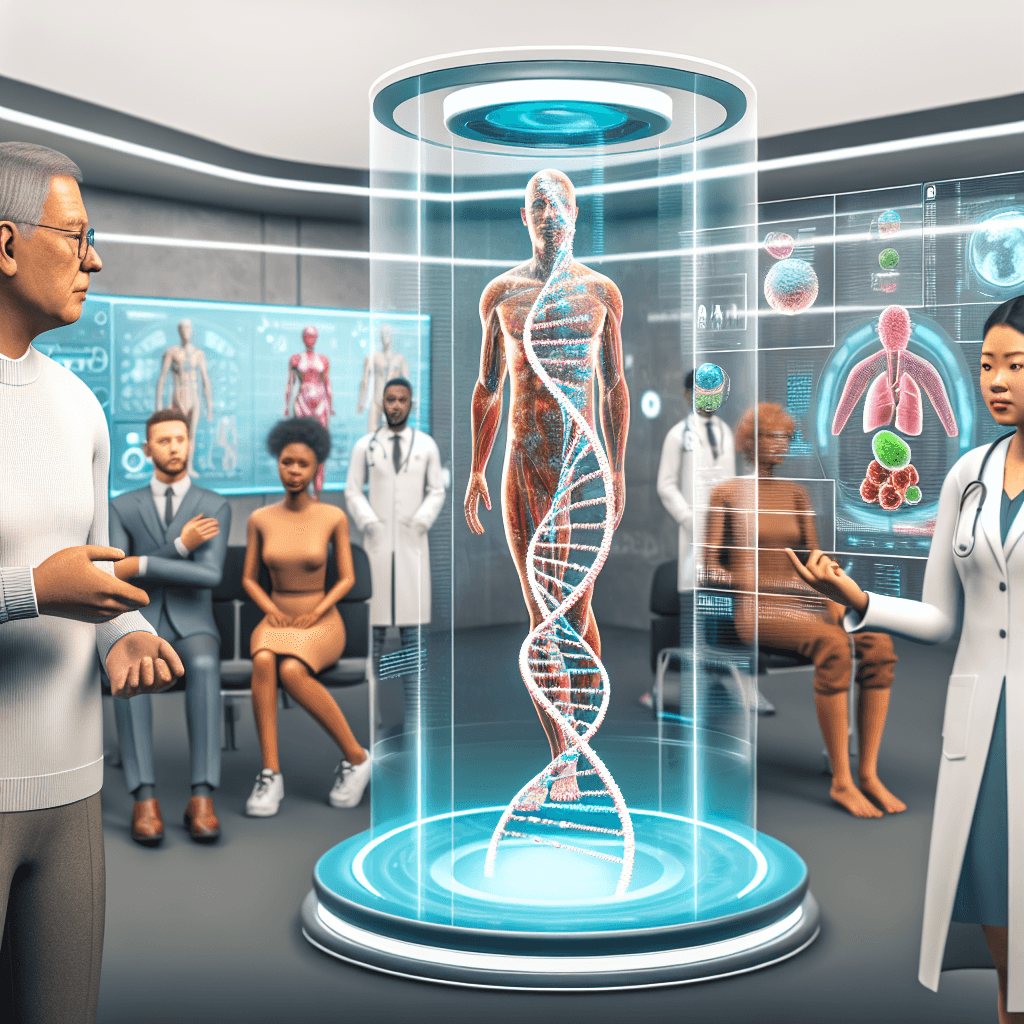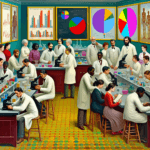Discover the exciting potential of personalized medicine in the future of life sciences. Explore how tailored treatments can revolutionize healthcare.
The Future of Life Sciences in Personalized Medicine

Table of Contents
“Revolutionizing healthcare, one individual at a time with personalized medicine in the future of life sciences.”
Introduction
The field of life sciences is constantly evolving and advancing, with new discoveries and technologies emerging every day. One area that has seen significant growth and potential is personalized medicine. This approach to healthcare takes into account an individual’s unique genetic makeup, lifestyle, and environment to tailor treatments and preventive measures. As we continue to unlock the mysteries of the human body and its complex systems, the future of life sciences in personalized medicine holds great promise for improving health outcomes and revolutionizing the way we approach healthcare. In this essay, we will explore the current state and potential future developments in this exciting field.
The Impact of Precision Medicine on Healthcare Delivery
The field of personalized medicine, also known as precision medicine, has been gaining momentum in recent years. This approach to healthcare focuses on tailoring medical treatments to the individual characteristics of each patient, rather than a one-size-fits-all approach. With advancements in technology and the availability of vast amounts of data, personalized medicine has the potential to revolutionize the way we deliver healthcare.
One of the key impacts of precision medicine on healthcare delivery is the ability to identify and treat diseases at an earlier stage. By analyzing an individual’s genetic makeup, lifestyle, and environmental factors, healthcare providers can identify potential health risks and intervene before a disease progresses. This not only improves patient outcomes but also reduces the burden on the healthcare system by preventing costly and complex treatments.
In addition to early detection, personalized medicine also allows for more targeted and effective treatments. Traditional medicine often relies on trial and error, with patients trying multiple treatments before finding one that works for them. With personalized medicine, treatments can be tailored to an individual’s genetic profile, increasing the chances of success and reducing the risk of adverse reactions. This not only improves patient satisfaction but also reduces healthcare costs by avoiding unnecessary treatments.
Another significant impact of precision medicine on healthcare delivery is the potential to improve patient engagement and adherence to treatment plans. By involving patients in the decision-making process and providing them with personalized treatment options, they are more likely to be invested in their own health. This can lead to better treatment outcomes and a more proactive approach to managing their health.
Furthermore, personalized medicine has the potential to improve the efficiency of healthcare delivery. With the use of electronic health records and data analytics, healthcare providers can access and analyze vast amounts of patient data in real-time. This allows for more accurate diagnoses, personalized treatment plans, and better monitoring of patient progress. It also reduces the administrative burden on healthcare providers, allowing them to focus on delivering quality care to their patients.
The impact of personalized medicine on healthcare delivery is not limited to individual patients. It also has the potential to improve population health. By analyzing large datasets, researchers can identify patterns and trends in disease prevalence, risk factors, and treatment outcomes. This information can then be used to develop targeted public health interventions and policies, leading to better overall health outcomes for communities.
However, the implementation of personalized medicine in healthcare delivery does come with its challenges. One of the main barriers is the cost of genetic testing and data analysis. While the cost of genetic sequencing has significantly decreased in recent years, it is still not accessible to everyone. This raises concerns about equity and access to personalized medicine, particularly for marginalized communities.
Another challenge is the need for robust data privacy and security measures. With the collection and analysis of vast amounts of personal data, there is a risk of data breaches and misuse. Healthcare providers must ensure that patient data is protected and used ethically, with the patient’s consent.
In conclusion, the future of life sciences in personalized medicine has the potential to transform healthcare delivery. By leveraging technology and data, personalized medicine can improve early detection, treatment effectiveness, patient engagement, and population health. However, it is crucial to address the challenges of cost, equity, and data privacy to ensure that personalized medicine benefits all individuals and communities. As technology continues to advance, the potential for personalized medicine to revolutionize healthcare delivery will only continue to grow.
Advancements in Genomic Sequencing and Personalized Treatments

The field of life sciences has seen significant advancements in recent years, particularly in the area of personalized medicine. This approach to healthcare involves tailoring treatments and medications to an individual’s unique genetic makeup, rather than a one-size-fits-all approach. This has the potential to revolutionize the way we treat diseases and improve patient outcomes. One of the key technologies driving this progress is genomic sequencing.
Genomic sequencing is the process of determining the complete DNA sequence of an organism’s genome. This includes all of the genetic material that makes up an individual, including both coding and non-coding regions. With the development of high-throughput sequencing technologies, it is now possible to sequence an individual’s entire genome in a matter of days, at a fraction of the cost compared to just a few years ago.
This has opened up a world of possibilities for personalized medicine. By analyzing an individual’s genetic code, doctors can identify specific genetic variations that may predispose them to certain diseases or affect their response to certain medications. This information can then be used to develop personalized treatment plans that are tailored to the individual’s unique genetic profile.
One of the most significant applications of genomic sequencing in personalized medicine is in the field of cancer treatment. Cancer is a complex disease, and each individual’s cancer is unique. By sequencing the tumor’s genome, doctors can identify specific genetic mutations that are driving the cancer’s growth. This information can then be used to develop targeted therapies that specifically target these mutations, resulting in more effective and less toxic treatments.
In addition to cancer, genomic sequencing is also being used to personalize treatments for a range of other diseases, including rare genetic disorders, cardiovascular diseases, and neurological disorders. For example, in rare genetic disorders, where traditional treatments may not be effective, genomic sequencing can help identify the underlying genetic cause of the disease, allowing for more targeted and effective treatments.
Another exciting development in the field of personalized medicine is the use of gene editing technologies, such as CRISPR-Cas9. This technology allows scientists to make precise changes to an individual’s genetic code, potentially correcting disease-causing mutations. While still in its early stages, this technology has the potential to revolutionize the treatment of genetic diseases and may even be used to prevent diseases from developing in the first place.
However, with these advancements come ethical considerations. The use of gene editing technologies raises questions about the potential for unintended consequences and the potential for creating “designer babies.” As with any new technology, careful consideration and regulation are necessary to ensure its responsible and ethical use.
In addition to personalized treatments, genomic sequencing is also being used to improve disease prevention and early detection. By analyzing an individual’s genetic code, doctors can identify their risk for developing certain diseases and take proactive measures to prevent or delay their onset. This can include lifestyle changes, such as diet and exercise, or targeted screening and monitoring for early detection.
The future of life sciences in personalized medicine is bright, with the potential to transform the way we approach healthcare. However, there are still challenges to overcome, such as the high cost of genomic sequencing and the need for more research to fully understand the complexities of the human genome. But with continued advancements and collaboration between scientists, healthcare professionals, and policymakers, personalized medicine has the potential to improve patient outcomes and revolutionize the healthcare industry.
The Role of Artificial Intelligence in Personalized Medicine
The field of personalized medicine has been rapidly advancing in recent years, thanks in part to the integration of artificial intelligence (AI) technology. AI has the potential to revolutionize the way we approach healthcare, particularly in the realm of life sciences. With its ability to analyze vast amounts of data and identify patterns, AI is poised to play a crucial role in the future of personalized medicine.
One of the key areas where AI is making an impact is in the development of precision therapies. These are treatments that are tailored to an individual’s specific genetic makeup, rather than a one-size-fits-all approach. AI algorithms can analyze a patient’s genetic data and identify potential targets for treatment, leading to more effective and personalized therapies.
In addition to precision therapies, AI is also being used to improve the accuracy and speed of diagnosis. By analyzing medical images and patient data, AI algorithms can assist healthcare professionals in identifying diseases and conditions at an earlier stage. This can lead to more timely and effective treatment, ultimately improving patient outcomes.
Another area where AI is proving to be invaluable is in drug discovery and development. The traditional drug discovery process is time-consuming and costly, with a high failure rate. However, with the help of AI, researchers can sift through vast amounts of data and identify potential drug candidates much more efficiently. This not only speeds up the drug development process but also reduces costs, making it more feasible to develop treatments for rare diseases.
AI is also playing a crucial role in clinical trials. By analyzing patient data and identifying patterns, AI algorithms can help researchers identify the most suitable candidates for clinical trials. This not only saves time and resources but also ensures that the right patients are selected for trials, leading to more accurate and reliable results.
One of the most exciting applications of AI in personalized medicine is in the field of genomics. With the advancement of technology, it is now possible to sequence an individual’s entire genome at a relatively low cost. However, the challenge lies in analyzing and interpreting this vast amount of genetic data. This is where AI comes in, with its ability to identify patterns and make connections between genetic variations and diseases. By combining AI with genomics, researchers can gain a deeper understanding of the genetic basis of diseases and develop more targeted treatments.
AI is also being used to improve patient outcomes through predictive analytics. By analyzing patient data, AI algorithms can identify individuals who are at high risk for certain diseases or conditions. This allows healthcare professionals to intervene early and prevent or delay the onset of these conditions. Additionally, AI can also help predict how a patient will respond to a particular treatment, allowing for more personalized and effective care.
However, as with any technology, there are challenges and limitations to consider. One of the main concerns with AI in personalized medicine is the potential for bias in the algorithms. If the data used to train the AI is not diverse enough, it can lead to biased results and perpetuate health disparities. It is crucial for researchers to ensure that the data used to train AI algorithms is representative of the population to avoid these biases.
In conclusion, the integration of AI technology in personalized medicine has the potential to transform healthcare as we know it. From precision therapies to drug discovery and development, AI is playing a crucial role in advancing personalized medicine. However, it is essential to address the challenges and limitations to ensure that AI is used ethically and responsibly in healthcare. With continued research and development, AI has the potential to improve patient outcomes and revolutionize the field of personalized medicine.
Ethical Considerations in the Future of Personalized Medicine
Personalized medicine, also known as precision medicine, is a rapidly growing field in the life sciences industry. It involves tailoring medical treatments to an individual’s unique genetic makeup, lifestyle, and environment. This approach has the potential to revolutionize healthcare by providing more effective and targeted treatments for various diseases. However, as with any emerging technology, there are ethical considerations that must be carefully examined and addressed in order to ensure the responsible and ethical use of personalized medicine in the future.
One of the main ethical concerns surrounding personalized medicine is the potential for discrimination based on genetic information. With the increasing availability of genetic testing, individuals may be hesitant to undergo testing for fear of being discriminated against by employers or insurance companies. This fear is not unfounded, as there have been cases where individuals have been denied employment or insurance coverage based on their genetic predispositions to certain diseases. This raises questions about the privacy and confidentiality of genetic information and the need for strict regulations to protect individuals from discrimination.
Another ethical consideration is the potential for unequal access to personalized medicine. As with any new technology, there is a risk that it will only be available to those who can afford it, creating a divide between the wealthy and the less fortunate. This could lead to a situation where only a select few have access to the most advanced and effective treatments, while others are left with less effective or outdated options. To prevent this, there must be efforts to ensure that personalized medicine is accessible and affordable for all individuals, regardless of their socioeconomic status.
In addition to these concerns, there is also the issue of informed consent. With personalized medicine, individuals may be asked to share their genetic information for research purposes. While this can lead to advancements in the field, it also raises questions about the level of understanding and consent individuals have when it comes to sharing their genetic data. It is crucial that individuals are fully informed about the potential risks and benefits of sharing their genetic information and that their consent is obtained in an ethical and transparent manner.
Furthermore, there is the issue of data privacy and security. With the vast amount of genetic data being collected and stored, there is a risk of this information being accessed or used without the individual’s consent. This could lead to sensitive information being exposed or used for purposes other than medical treatment. To address this concern, strict regulations and protocols must be in place to ensure the secure storage and use of genetic data.
Another ethical consideration is the potential for false positives or false negatives in genetic testing. As personalized medicine relies heavily on genetic testing, there is a risk of inaccurate results, which could lead to incorrect diagnoses and treatments. This could have serious consequences for individuals, both physically and emotionally. Therefore, it is crucial that genetic testing is conducted with the highest level of accuracy and that individuals are fully informed about the limitations and potential risks of these tests.
Finally, there is the issue of the role of healthcare professionals in personalized medicine. With the increasing use of technology and data analysis, there is a concern that healthcare professionals may become too reliant on these tools and lose the human element of patient care. It is essential that healthcare professionals are trained to use personalized medicine in an ethical and responsible manner, while still maintaining a patient-centered approach.
In conclusion, while personalized medicine has the potential to greatly improve healthcare, there are ethical considerations that must be carefully examined and addressed. These include concerns about discrimination, access, informed consent, data privacy, accuracy of testing, and the role of healthcare professionals. It is crucial that these ethical considerations are taken into account in the development and implementation of personalized medicine to ensure its responsible and ethical use in the future.
Q&A
1. What is personalized medicine?
Personalized medicine is an approach to healthcare that takes into account an individual’s unique genetic makeup, environment, and lifestyle to tailor medical treatments and interventions for their specific needs. This allows for more precise and effective treatments, as well as the potential for prevention of diseases before they occur.
2. How is personalized medicine changing the life sciences industry?
Personalized medicine is revolutionizing the life sciences industry by shifting the focus from a one-size-fits-all approach to a more individualized and targeted approach. This has led to advancements in genetic testing, biomarker identification, and the development of personalized therapies and treatments. It has also opened up new opportunities for collaboration between different sectors of the life sciences industry, such as pharmaceutical companies, biotech firms, and diagnostic companies.
3. What are some potential benefits of personalized medicine?
Some potential benefits of personalized medicine include improved treatment outcomes, reduced adverse reactions to medications, and the ability to identify and prevent diseases before they occur. It also has the potential to reduce healthcare costs by avoiding unnecessary treatments and interventions.
4. What are some challenges facing the future of life sciences in personalized medicine?
One of the main challenges facing the future of life sciences in personalized medicine is the need for more data and research to fully understand the complexities of individual genetics and how they interact with environmental and lifestyle factors. There are also ethical considerations surrounding the use of personal genetic information and the potential for discrimination. Additionally, there may be barriers to implementing personalized medicine on a larger scale, such as cost and access to technology and resources.
Conclusion
In conclusion, the future of life sciences in personalized medicine is promising and holds great potential for improving healthcare outcomes. With advancements in technology and the ability to analyze individual genetic data, personalized medicine has the potential to revolutionize the way we prevent, diagnose, and treat diseases. It allows for tailored treatments that are specific to each individual’s unique genetic makeup, leading to more effective and efficient healthcare. However, there are still challenges to overcome, such as ethical considerations and access to personalized medicine for all individuals. Overall, the future of life sciences in personalized medicine is bright and has the potential to greatly benefit individuals and society as a whole.








